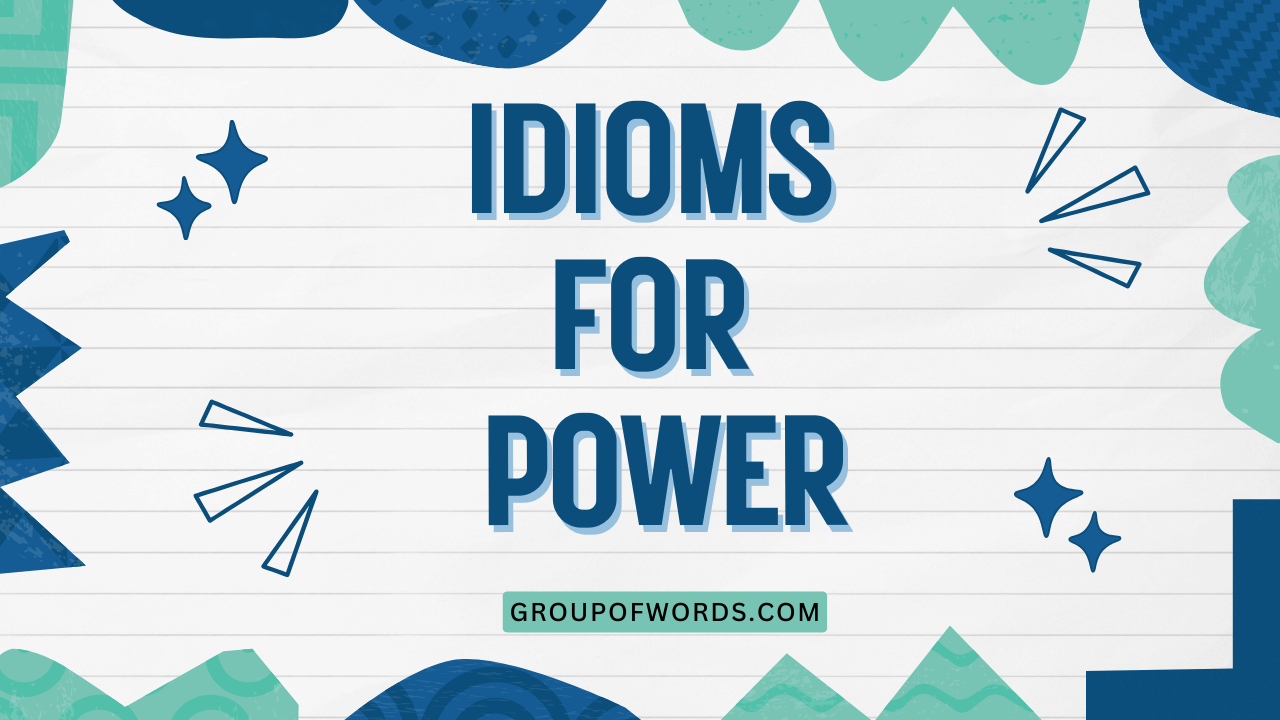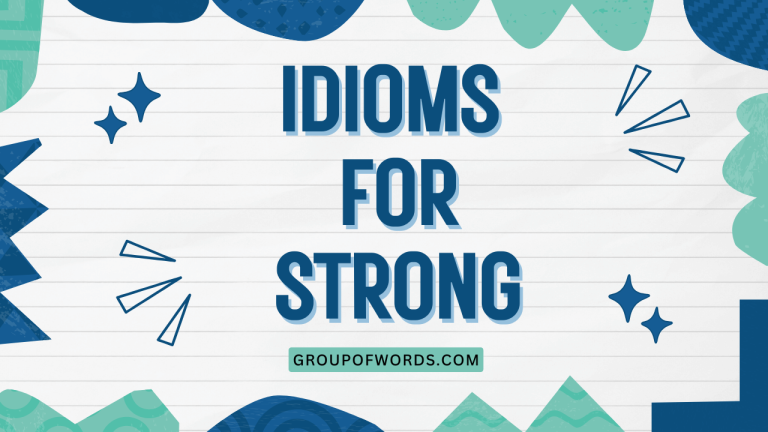Power Up Your English: Mastering Idioms for Influence
Idioms are the colorful threads that weave through the fabric of the English language, adding depth, nuance, and a touch of personality to our communication. Mastering idioms, especially those related to power and influence, can significantly enhance your ability to understand and engage in sophisticated conversations.
This article will guide you through a comprehensive exploration of idioms related to power, their meanings, structural nuances, and practical usage. Whether you’re a student, a professional, or simply an English enthusiast, this guide will equip you with the knowledge and skills to wield these linguistic tools effectively.
By understanding these idioms, you’ll not only improve your comprehension of native speakers but also gain the ability to express yourself with greater precision and impact. This article will provide you with clear definitions, illustrative examples, and practical exercises to solidify your understanding and build your confidence in using these powerful expressions.
Table of Contents
- Introduction
- Definition of Idioms for Power
- Structural Breakdown
- Types and Categories of Power Idioms
- Examples of Power Idioms
- Usage Rules
- Common Mistakes
- Practice Exercises
- Advanced Topics
- FAQ
- Conclusion
Definition of Idioms for Power
Idioms are expressions whose meanings cannot be understood from the literal meanings of the individual words. Instead, they function as a unit with a figurative or symbolic meaning.
Idioms for power are a subset of these expressions that specifically relate to concepts of authority, control, influence, domination, and the lack thereof. These idioms often paint a vivid picture of power dynamics, helping us to understand and describe complex social and political situations.
Understanding these idioms is crucial for several reasons. First, they are frequently used in both formal and informal settings, including business meetings, political debates, and everyday conversations.
Second, they provide a concise and impactful way to convey complex ideas about power relationships. Finally, mastering these idioms can significantly enhance your overall fluency and comprehension of the English language.
They add color and depth to your communication, making you a more effective and engaging speaker.
The function of idioms for power extends beyond simple description. They can be used to subtly critique, satirize, or even celebrate power dynamics.
The context in which an idiom is used often determines its specific meaning and impact. For example, the idiom “call the shots” can be used to describe a decisive leader or to criticize someone who is being overly controlling.
Structural Breakdown
The structure of idioms for power, like that of all idioms, varies widely. Some idioms are simple phrases consisting of a few words, while others are more complex clauses or even complete sentences.
The key characteristic is that the meaning of the idiom is not directly related to the literal meanings of its constituent words.
Many idioms for power involve verbs and nouns that evoke images of control, authority, or influence. For example, the idiom “pull the strings” uses the image of a puppeteer to represent someone who is secretly controlling a situation.
Similarly, the idiom “have the upper hand” uses a metaphor from physical combat to describe a position of advantage.
It’s important to note that the grammatical structure of an idiom is often fixed. You cannot arbitrarily change the words or word order without altering its meaning or rendering it nonsensical.
For instance, you can say “He calls the shots,” but you cannot say “He calls the balls” and expect it to convey the same meaning.
Understanding the structural elements of idioms can help you to remember and use them correctly. Pay attention to the specific words used, their order, and any prepositions or articles that are included.
Practice using the idioms in context to solidify your understanding of their structure and meaning.
Types and Categories of Power Idioms
Idioms related to power can be categorized based on the specific aspect of power they describe. Here are some key categories:
Idioms Related to Authority
These idioms describe the legitimate right to exercise power or control. They often involve concepts of leadership, command, and official position.
Idioms Related to Control
These idioms focus on the ability to direct, regulate, or restrain actions or behaviors. They often involve concepts of manipulation, management, and influence.
Idioms Related to Influence
These idioms describe the capacity to affect the character, development, or behavior of someone or something. They often involve concepts of persuasion, sway, and impact.
Idioms Related to Domination
These idioms relate to the exercise of control or influence over someone or something in an oppressive or overbearing way. They often involve concepts of subjugation, tyranny, and suppression.
Idioms Related to Lack of Power
These idioms describe situations where someone or something lacks authority, control, or influence. They often involve concepts of vulnerability, helplessness, and subordination.
Examples of Power Idioms
Here are some examples of idioms related to power, organized by category:
Examples Related to Authority
The table below presents idioms related to authority. Each entry includes the idiom, its meaning, and an example sentence to illustrate its usage.
| Idiom | Meaning | Example Sentence |
|---|---|---|
| Call the shots | To make the important decisions | As the CEO, she calls the shots for the entire company. |
| Have the last word | To have the final say | He always has to have the last word in any argument. |
| Wear the pants in the family | To be the dominant person in a relationship or family | Everyone knows she wears the pants in the family. |
| Rule the roost | To be in charge; to be the boss | The manager rules the roost in this department. |
| Lay down the law | To state a rule or requirement firmly | The teacher laid down the law about cell phone use in class. |
| At the helm | In a position of leadership | With her at the helm, the company is sure to succeed. |
| In the driver’s seat | In control of a situation | He’s finally in the driver’s seat after years of hard work. |
| Set the agenda | To decide what issues are important and should be addressed | The president set the agenda for the upcoming meeting. |
| Have the floor | To have the right to speak | I believe Mr. Johnson has the floor. |
| To be in charge | Responsibility for controlling or caring for someone/something | She is in charge of the marketing department |
| To be at the top of the ladder | To be at the highest rank in your field/company | After 20 years, he is at the top of the ladder. |
| To have authority | To have power or control | The principal has the authority to suspend students. |
| Give the orders | To be the person who tells others what to do | The general gave the orders for the troops to advance. |
| Pass judgment | To make a critical assessment of someone or something | The judge will pass judgment on the defendant tomorrow. |
| Bear the standard | To lead or represent a group or cause | She bears the standard for environmental protection. |
| To be at the command | To be in a position to give orders | The captain is at the command of the ship. |
| To be in control | To have power to direct or manage something | The pilot is in control of the aircraft. |
| To be in power | To have the authority to govern | The ruling party is in power for another term. |
| To be in the saddle | To be in control of a situation or organization | He is in the saddle as the new CEO. |
| To have the reins | To be in control or have the power to direct something | She has the reins of the project now. |
| To hold sway | To have influence or power over someone or something | His opinions hold sway over the entire committee. |
| To reign supreme | To be the most powerful or dominant | The company reigns supreme in the tech industry. |
Examples Related to Control
The table below presents idioms related to control, detailing their meanings and providing example sentences.
| Idiom | Meaning | Example Sentence |
|---|---|---|
| Pull the strings | To secretly control someone or something | He pulls the strings behind the scenes to get what he wants. |
| Have someone in your pocket | To have control over someone | The corrupt politician has several officials in his pocket. |
| Keep someone on a tight leash | To control someone very closely | The manager keeps his employees on a tight leash. |
| Call the tune | To be in control and make the decisions | The boss calls the tune in this company. |
| Have a grip on | To have control over something | She has a good grip on the project. |
| Keep in check | To control or restrain something | The government is trying to keep inflation in check. |
| At your beck and call | Always ready to obey someone’s orders | He expects everyone to be at his beck and call. |
| Run the show | To be in charge and control everything | She runs the show at the advertising agency. |
| Keep the lid on | To keep something secret or under control | They’re trying to keep the lid on the scandal. |
| To have in hand | To be in control of a situation | He has the situation in hand. |
| To steer the ship | To direct or control the course of an organization or project | The new CEO will steer the ship in a new direction. |
| To be at the mercy of | To be in a situation where you are controlled by someone or something | The company is at the mercy of the stock market. |
| To twist someone’s arm | To persuade someone to do something they don’t want to do | He had to twist my arm to get me to agree. |
| To have a tight rein | To have strict control over something | The government has a tight rein on the media. |
| To be under someone’s thumb | To be controlled or dominated by someone | He doesn’t like being under his boss’s thumb. |
| To be in the pocket of | To be controlled by someone, often through bribery or influence | The politician is in the pocket of the lobbyists. |
| To be a puppet on a string | To be controlled by someone else | He feels like a puppet on a string in his new job. |
| To manipulate the system | To control or influence the system unfairly | They were accused of manipulating the system for their own gain. |
| To dominate the field | To control or have a very strong influence in a particular area | The company dominates the field of technology. |
| To dictate terms | To impose conditions or requirements on someone | The company dictated terms to its suppliers. |
| To call the shots | To make the important decisions | As the CEO, she calls the shots for the entire company. |
| To be in the driver’s seat | To be in control of a situation | He’s finally in the driver’s seat after years of hard work. |
Examples Related to Influence
The table below provides idioms centered around the theme of influence, with clear definitions and illustrative sentences.
| Idiom | Meaning | Example Sentence |
|---|---|---|
| Carry weight | To have influence or importance | His opinion carries a lot of weight in the company. |
| Pull strings | To use your influence to get something done | He had to pull strings to get his son into the prestigious school. |
| Have a say | To have the right to express your opinion or influence a decision | Everyone should have a say in how the project is managed. |
| Twist someone’s arm | To persuade someone to do something they don’t want to do | I didn’t want to go, but she twisted my arm. |
| Rub off on someone | To have an influence on someone | His enthusiasm rubbed off on the rest of the team. |
| Get to someone | To influence or affect someone | The criticism really got to him. |
| Have a hold over someone | To have influence or control over someone | She has a hold over him because of a secret. |
| Sway someone’s opinion | To influence someone to change their mind | He tried to sway her opinion, but she remained firm. |
| Hold sway | To have influence or power | Tradition still holds sway in many rural communities. |
| To make waves | To cause trouble or disruption | He’s always making waves with his controversial opinions. |
| To plant a seed | To introduce an idea that may influence future actions | He planted a seed in her mind about starting her own business. |
| To have a domino effect | To cause a series of related events to happen | The strike had a domino effect on the entire industry. |
| To set the tone | To establish a particular mood or character | The speaker set the tone for the conference with his inspiring speech. |
| To win someone over | To persuade someone to support you or agree with you | He managed to win them over with his charm and intelligence. |
| To carry weight | To have influence or importance | His opinion carries weight in the board room. |
| To pull strings | To use personal influence to get something done | She had to pull strings to get the project approved. |
| To be a driving force | To be a major influence or cause | He is a driving force behind the company’s success. |
| To shape the future | To influence the way something develops in the future | Education shapes the future of our society. |
| To impact greatly | To have a significant effect on something | The new policy impacted greatly the employees’ morale. |
| To leave a mark | To have a lasting influence or effect | His work left a mark on the field of medicine. |
| To turn the tide | To reverse the course of events | The new strategy turned the tide in the company’s favor. |
Examples Related to Domination
This section explores idioms that convey the concept of domination, providing clarity through definitions and context.
| Idiom | Meaning | Example Sentence |
|---|---|---|
| Have someone eating out of your hand | To have complete control over someone | The cult leader had his followers eating out of his hand. |
| Crush someone under your heel | To oppress or dominate someone ruthlessly | The dictator crushed any opposition under his heel. |
| Rule with an iron fist | To govern in a harsh and authoritarian way | The general rules the country with an iron fist. |
| Keep someone in line | To control someone and make them obey | The strict parents keep their children in line. |
| To be a bully | To use strength or power to harm or intimidate | He is a bully, always pushing others around. |
| To call all the shots | To make all the important decisions and control everything | The CEO calls all the shots in this company. |
| To have the upper hand | To have an advantage over someone | In the negotiation, they had the upper hand. |
| To run roughshod over | To disregard or treat something or someone without respect | The company ran roughshod over the local community. |
| To throw one’s weight around | To use your power or authority to intimidate others | He likes to throw his weight around at meetings. |
| To crack the whip | To use authority to make someone work harder or behave better | The manager had to crack the whip to meet the deadline. |
| To have someone over a barrel | To have someone in a situation where they are completely dependent on you | The lender has them over a barrel because of their debt. |
| To keep someone down | To prevent someone from succeeding or improving their situation | The system is designed to keep certain groups down. |
| To have the last word | To have the final say in a decision | She always has to have the last word in every argument. |
| To lay down the law | To state a rule or requirement firmly | The principal laid down the law about cell phone use at school. |
| To be at someone’s mercy | To be in a situation where you are completely dependent on someone’s kindness or goodwill | The refugees were at the mercy of the aid organizations. |
| To bring someone to their knees | To defeat or subdue someone completely | The economic crisis brought many businesses to their knees. |
| To ride roughshod over | To treat someone or something with contempt or disregard their feelings | The corporation rode roughshod over the environmental regulations. |
| To keep a tight rein on | To maintain strict control over someone or something | The government keeps a tight rein on the media. |
| To have a stranglehold on | To have complete control over something, often in a negative way | The monopoly has a stranglehold on the market. |
| To rule the roost | To be in charge; to be the boss | The CEO rules the roost in the company. |
Examples Related to Lack of Power
This section showcases idioms that describe situations of weakness or lack of power, each with a definition and example.
| Idiom | Meaning | Example Sentence |
|---|---|---|
| At someone’s mercy | In a situation where you are completely dependent on someone | The small business was at the mercy of the large corporation. |
| Under someone’s thumb | Controlled or dominated by someone | He felt like he was always under his boss’s thumb. |
| A pawn in someone’s game | Someone used by others for their own purposes | She realized she was just a pawn in his game. |
| A paper tiger | Someone or something that appears powerful but is actually weak | The dictator was revealed to be a paper tiger when the rebellion started. |
| To be a sitting duck | To be an easy target | Without security measures, the company was a sitting duck for hackers. |
| To have no say | To have no influence or control over a decision | The employees had no say in the new company policy. |
| To be a pushover | Someone who is easily persuaded or taken advantage of | He’s such a pushover; he always agrees to everything. |
| To be on the ropes | To be in a very difficult situation, close to defeat | The company was on the ropes after the scandal. |
| To be a doormat | Someone who allows others to treat them badly | She’s tired of being a doormat and standing up for herself. |
| To be in a bind | To be in a difficult situation | He’s in a bind because he needs the money but doesn’t want the job. |
| To be left out in the cold | To be ignored or excluded | The smaller companies were left out in the cold when the deal was made. |
| To be down and out | To be in a very bad situation, with no money or hope | He was down and out after losing his job and his home. |
| To be at the bottom of the pecking order | To have the lowest status in a group | As the newest employee, he was at the bottom of the pecking order. |
| To be a victim of circumstances | To suffer because of events beyond your control | They were victims of circumstances when the factory closed down. |
| To be caught between a rock and a hard place | To be in a situation where you have to choose between two equally unpleasant options | He was caught between a rock and a hard place when asked to lie for his boss. |
| To be a feather in the wind | To be easily influenced or controlled | Without a strong will, he is a feather in the wind. |
| To be a shadow of someone | To be much less impressive or powerful than someone else | The team is a shadow of its former glory. |
| To be on shaky ground | To be in an uncertain or insecure position | His job is on shaky ground after the company’s losses. |
| To be under the weather | To be slightly ill or unwell | She’s been under the weather lately and hasn’t been as productive. |
| To be outgunned | To be at a disadvantage because someone else has more resources or power | The small company was outgunned by the larger corporation. |
Usage Rules
Using idioms correctly requires an understanding of their specific meanings and contexts. Here are some general rules to follow:
- Use idioms in appropriate contexts: Consider the formality of the situation and the audience you are addressing. Some idioms are more appropriate for informal conversations, while others are suitable for formal presentations or written reports.
- Avoid overusing idioms: While idioms can add color and depth to your communication, using too many can make your speech sound unnatural or contrived.
- Pay attention to grammatical structure: Idioms often have a fixed grammatical structure. Avoid changing the words or word order, as this can alter their meaning or render them nonsensical.
- Be aware of regional variations: Some idioms are more common in certain regions or dialects. Be mindful of your audience and avoid using idioms that they may not understand.
- Consider your audience: When speaking to non-native English speakers, be aware that idioms may not be easily understood. Use them sparingly and provide explanations when necessary.
It is also crucial to understand that while idioms can be powerful tools for communication, they can also be easily misunderstood if used incorrectly. Therefore, practice and exposure are key to mastering their usage.
Common Mistakes
One of the most common mistakes is interpreting idioms literally. Because idioms have figurative meanings, a literal interpretation will almost always be incorrect.
For example, someone might misunderstand “call the shots” to mean literally shouting instructions for taking photographs.
Another frequent mistake is changing the words or word order of an idiom. This can alter its meaning or make it nonsensical.
For example, saying “He has the upper foot” instead of “He has the upper hand” changes the meaning and sounds incorrect.
Finally, many learners overuse idioms, especially when they are first learning them. This can make their speech sound unnatural or contrived.
It’s best to use idioms sparingly and only when they are appropriate for the context.
Here are some examples of common mistakes and their corrections:
| Incorrect | Correct | Explanation |
|---|---|---|
| He called the balls. | He called the shots. | “Call the shots” is the correct idiom for making decisions. |
| She wears the trousers in the house. | She wears the pants in the family. | “Wears the pants in the family” is the correct idiom. |
| They have him in their pocketbook. | They have him in their pocket. | “Have someone in your pocket” is the correct idiom. |
| He is pulling my leg. | He is twisting my arm. | “Twisting my arm” is correct when someone is persuaded against their will. |
Practice Exercises
Test your understanding of power idioms with these exercises:
Exercise 1: Multiple Choice
Choose the best idiom to complete each sentence.
| Question | Options | Answer |
|---|---|---|
| As the team leader, she ___________ in the project. | a) calls the shots b) pulls the strings c) has a say d) keeps in check | a) calls the shots |
| The corrupt politician ___________ of several local officials. | a) has a grip on b) has them in his pocket c) rules the roost d) sets the agenda | b) has them in his pocket |
| The manager ___________ to ensure productivity. | a) lays down the law b) wears the pants c) steers the ship d) is at the helm | a) lays down the law |
| He had to ___________ to get his proposal approved. | a) pull strings b) keep the lid on c) run the show d) have the floor | a) pull strings |
| Tradition still ___________ in the village. | a) calls the tune b) has a grip on c) holds sway d) sets the agenda | c) holds sway |
| After years of hard work, he is finally ___________ . | a) in the driver’s seat b) at his beck and call c) under his thumb d) at someone’s mercy | a) in the driver’s seat |
| She is tired of being ___________ and wants to stand up for herself. | a) a paper tiger b) a sitting duck c) a doormat d) a feather in the wind | c) a doormat |
| The company was ___________ after the scandal broke. | a) on the ropes b) a pawn in someone’s game c) under someone’s thumb d) in a bind | a) on the ropes |
| The new policy ___________ the employees’ morale. | a) left a mark on b) impacted greatly c) won them over d) planted a seed in | b) impacted greatly |
| The dictator ___________ . | a) had them eating out of his hand b) was at their beck and call c) had no say d) was caught between a rock and a hard place | a) had them eating out of his hand |
Exercise 2: Fill in the Blanks
Complete the sentences with appropriate idioms from the list below.
(call the tune, have the last word, keep someone in line, at someone’s mercy, run the show, wear the pants, under someone’s thumb, have a say, pull strings, shape the future)
| Question | Answer |
|---|---|
| In that household, she definitely ___________ . | wears the pants |
| The boss lets his assistant ___________ in most decisions. | have a say |
| The company is ___________ of the stock market’s fluctuations. | at someone’s mercy |
| The strict teacher always ___________ in her classroom. | keeps students in line |
| He always tries to ___________ during arguments. | have the last word |
| The CEO ___________ and makes all the important decisions. | calls the tune |
| The director ___________ at the theater, overseeing every aspect of the production. | runs the show |
| He had to ___________ to get his project approved by the committee. | pull strings |
| She felt like she was ___________, constantly being controlled by her overbearing boss. | under someone’s thumb |
| Education can ___________ by equipping young people with the skills and knowledge they need to succeed. | shape the future |
Exercise 3: Sentence Completion
Complete each sentence using an appropriate idiom related to power.
| Question | Answer |
|---|---|
| After the merger, the smaller company found itself ____________________. | at the mercy of the larger corporation |
| Despite his official title, it was clear that his assistant was the one who ____________________. | was calling the shots |
| The dictator ruled his country ____________________, suppressing all dissent and opposition. | with an iron fist |
| She had to ____________________ to get her daughter into the exclusive private school. | pull some strings |
| The new manager’s enthusiasm and energy quickly ____________________ on the rest of the team. | rubbed off |
| The scandal left the politician ____________________, with his career hanging in the balance. | on the ropes |
| The company’s innovative new product ____________________ and completely transformed the industry. | turned the tide |
| He is such a ____________________ that he always agrees to whatever his boss asks him to do. | pushover |
| The corrupt official ____________________ to enrich himself and his cronies. | manipulated the system |
| The CEO’s decisions ____________________ and had a major impact on the company’s future. | carried a lot of weight |
Advanced Topics
For those looking to delve deeper, consider exploring the historical origins of specific power idioms. Many have roots in military, political, or social contexts that provide valuable insights into their meanings.
Additionally, examine how idioms related to power are used in literature, film, and other forms of media to convey complex themes and character dynamics.
Another advanced topic is the study of how power idioms vary across different cultures and languages. While some idioms may have direct equivalents in other languages, others may be unique to a particular culture.
Understanding these differences can help you to communicate more effectively in cross-cultural settings.
Finally, consider the ethical implications of using power idioms. While these expressions can be effective tools for communication, they can also be used to manipulate, deceive, or oppress others.
Be mindful of the impact of your words and use them responsibly.
FAQ
Why are idioms important in English?
Idioms add color, depth, and nuance to the English language. Understanding them enhances comprehension and allows for more effective and engaging communication.
How can I learn idioms more effectively?
Immerse yourself in the language through reading, listening, and speaking. Pay attention to how native speakers use idioms and practice using them in context.
Flashcards and mnemonic devices can also be helpful.
Are idioms the same in all English-speaking countries?
No, some idioms vary across different regions and dialects. Be aware of these variations and consider your audience when using idioms.
Is it okay to use idioms in formal writing?
Use idioms sparingly in formal writing and only when they are appropriate for the context. Avoid using idioms that are too informal or colloquial.
What should I do if I don’t understand an idiom?
Ask for clarification or look it up in a dictionary or online resource. Pay attention to the context in which the idiom is used, as this can provide clues to its meaning.
Can I create my own idioms?
While it’s possible to create new expressions, they will not be considered idioms until they are widely adopted and understood by native speakers. Focus on learning and using existing idioms correctly.
Conclusion
Mastering idioms for power is a valuable skill that can enhance your understanding and usage of the English language. By understanding the definitions, structural nuances, and usage rules of these expressions, you can communicate more effectively and engage in sophisticated conversations.
Remember to practice using idioms in context and be mindful of their ethical implications. With dedication and effort, you can wield these linguistic tools with confidence and precision.






